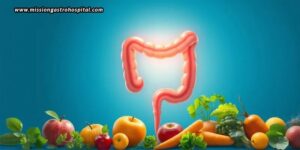
Since a colonoscopy directly examines the colon and rectum — the very organs that process and eliminate the food we consume — it’s no surprise that diet plays a vital role in its success. What you eat before and after the procedure can significantly influence both the clarity of the examination and the ease of recovery — despite common myths that make the process seem more intimidating than it is. A well-managed diet ensures the colon is clean for accurate visuals and helps the digestive system rebound smoothly afterward. Let’s explore some important dietary guidelines to help you prepare effectively, recover comfortably, and transition safely back to your regular eating habits for optimal outcomes.
The importance of diet in colonoscopy preparation
A clear view of the colon lining is essential for identifying polyps, inflammation, or other abnormalities during a colonoscopy. If residual faecal matter remains, it can obscure visibility and lead to inconclusive results or the need for a repeat procedure. This is why dietary preparation is so important. A low-fibre diet combined with clear liquids helps minimize residue in the intestines. Additionally, following the recommended diet enhances the effectiveness of the prescribed laxatives. Choosing the right fluids and light foods also supports patient comfort by reducing hunger, nausea, and electrolyte imbalances during the preparation phase, ensuring a smoother experience overall.
2–3 days before the procedure
A low-residue diet
A few days before your colonoscopy, switching to a low-residue diet helps minimize the amount of undigested material in your digestive tract. Choose foods like white rice, plain pasta, lean meats (such as chicken or fish), eggs, tofu, peeled potatoes, and refined cereals. These foods are easy to digest and leave minimal residue. Avoid whole grains, nuts, seeds, raw vegetables, beans, lentils, and fibrous fruits like berries, apples, or oranges. These can slow bowel clearance and make the prep less effective. This dietary shift supports gradual bowel emptying and allows your colon to be more effectively cleaned for the procedure.
1 day before the procedure
A clear liquid diet
The day before your colonoscopy, it’s critical to switch to a clear liquid diet to allow for complete bowel cleansing. Acceptable options include water, clear broths (chicken, beef, vegetable), strained fruit juices like apple or white grape, gelatine (avoiding red or purple colours), clear sodas, black coffee, and plain tea. Avoid milk, dairy, alcohol, juices with pulp, and red or purple liquids, as they can interfere with visibility during the procedure. For better tolerance, chill liquids or drink them slowly. Keeping hydrated and sipping clear fluids throughout the day can help manage hunger and maintain energy during the prep.
On the day of the procedure
An easy diet
After your colonoscopy, focus on gentle nourishment as your body recovers from sedation and the procedure itself. Start by sipping water, clear broths, or electrolyte drinks to rehydrate gradually. Once you feel ready, introduce light foods like plain toast, crackers, applesauce, or yogurt — simple, low-fat options that are easy on the digestive system. Avoid heavy, spicy, or greasy foods for at least 24 hours to reduce the risk of nausea or cramping. Eat slowly, chew thoroughly, and rest well throughout the day. Giving your body time to readjust will ease recovery and prevent unnecessary digestive discomfort.
1–2 days post-procedure
Returning to your regular diet
In the days following your colonoscopy, ease back into your regular diet with a focus on digestive health. Begin reintroducing high-fibre foods — such as fruits, vegetables, legumes, and whole grains — to promote regular bowel movements and restore gut balance. Include probiotics and prebiotics from sources like yogurt, kefir, bananas, onions, or sauerkraut to help replenish beneficial gut bacteria. Continue drinking 8–10 glasses of water daily to prevent dehydration and constipation. Be mindful of any lingering symptoms such as bloating or cramps, which may indicate a need to temporarily stick with softer, low-fibre foods while your digestive system fully recovers.
Dietary enhancements for healing and long-term wellness
Certain foods can actively support colon healing and promote long-term digestive health. Incorporating anti-inflammatory items like turmeric, ginger, and omega-3 rich foods such as salmon and flaxseeds may reduce inflammation in the bowel. Antioxidant-rich fruits and vegetables, like berries and spinach, aid in cellular repair after the procedure. Adding healthy fats from sources like olive oil and avocado not only supports digestion but also improves nutrient absorption. Making these additions a part of your regular diet can enhance recovery after colonoscopy and contribute to a healthier colon over time.
Addressing common concerns and building sustainable habits
Preparation and recovery come with practical challenges, but a few strategies can help. If nausea occurs during prep, rinse your mouth frequently, take small sips, or use ginger tea and peppermint lozenges. To prevent dehydration, increase your fluid intake with room-temperature water and clear electrolyte drinks. For hunger, rely on clear broths, popsicles, or juices to maintain energy. Avoid scheduling colonoscopy prep before social engagements due to frequent restroom use. After recovery, long-term dietary habits make a difference: aim for fibre daily, limit red meat, cut processed foods, and stay hydrated and active. These habits support sustained colon health and reduce the risk of future complications.
Diet is more than a preparatory measure; it’s a powerful tool in making your colonoscopy successful and your recovery smoother. The choices you make before and after the procedure impact visibility during the exam, your comfort level, and your healing process. By following low-residue and clear-liquid guidelines, easing back into solids mindfully, and maintaining long-term colon-friendly habits, you empower your digestive system to stay healthy. Always consult your healthcare provider for a plan tailored to your needs. With thoughtful dietary decisions, you’re not just preparing for a test, you’re investing in lifelong wellness. For personalized guidance and expert care, consult the best colonoscopy doctors in Ahmedabad at Mission Gastro Hospital, where the experienced team ensures safe procedures, clear instructions, and post-procedure dietary support tailored to your needs.
Resource : Read More